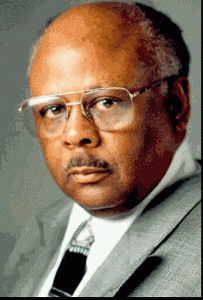Lifetime Achievers
This is the third in a series of articles about winners of the NSNC’s annual Ernie Pyle Lifetime Achievement Award.
By Dave Astor
Archivist
National Society of Newspaper Columnists

Dave Astor
As endless gun violence and contemptible political statements dominate the news cycle, what William Raspberry told the National Society of Newspaper Columnists in 1995 sounds, well, almost Pollyanna-ish. But it was an important message for NSNCers to hear.
“What goes wrong is always news,” said the syndicated Washington Post columnist, in remarks he made after receiving the NSNC’s Lifetime Achievement Award at our 1995 conference in Kansas City. “We need to know what goes wrong but also what works, such as the efforts of people who are knitting their communities together.”
Raspberry (1935-2012) added back then that focusing too much on bad news “can discourage people from doing good” and “poison relations” among American citizens.
The 1994 Pulitzer Prize winner for commentary, in describing why reporters often focus on the negative, said they’re taught from the start “that conflict has news value” and that “you need dramatic tension to tell a good story.” But Raspberry told the NSNC audience that “you can look for ways to create this without pitting individuals and groups against each other. You can create dramatic tension between the problem solver and the problem.”
Indeed, the Washington Post Writers Group syndicate marketed Raspberry as a “solutionist.”
Of course, the centrist Raspberry used his long-running column to discuss the negative as well as the positive — with the subjects he addressed including politics, war, and race.
“I was impressed with the broad range of topics he wrote about, both domestic and international,” said former NSNC board member Bob Haught when I asked him to comment about Raspberry for this story.
Raspberry also wrote more about education than most op-ed columnists (so it wasn’t a surprise that he spent some time teaching at Duke University).
Haught, who worked in Washington as a U.S. Senate aide and journalist for 25 years, added that he also admired Raspberry’s “keen sense of humor, which I was able to observe in his performances at the Washington Gridiron Club dinners.
“As a political satirist he also had a motto I liked. In targeting a public figure, he said: ‘You don’t want to smack him across the head with a dead mackerel.'”
Raspberry, who grew up in Mississippi, began his newspaper career with a summer job at the Indianapolis Recorder in 1956. His duties there as reporter, photographer, and editor inspired him to join the Post in 1962, after serving two years in the Army. At the Post, he first worked as a Teletype operator before becoming an award-winning general assignment reporter, copy editor and assistant city editor.
His column made its debut in the local section of the Post in 1966, and moved to the op-ed page five years later. At the time, Raspberry was one of the few African-American columnists at a major daily.
• • •
Dave Astor writes the “Montclairvoyant” humor column for The Montclair (N.J.) Times, blogs at DaveAstorOnLiterature.com, and is the author of the memoir Comic (and Column) Confessional.
• • •
This piece first was published in the January 2016 issue of The Columnist, the monthly membership newsletter of the National Society of Newspaper Columnists.


